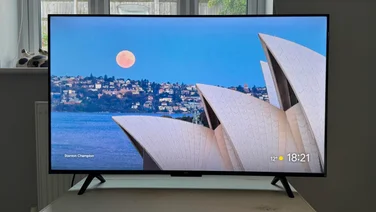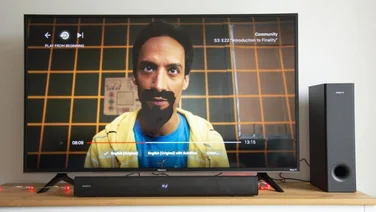To help us provide you with free impartial advice, we may earn a commission if you buy through links on our site. Learn more





- The best service line-up
- Straightforward controls
- Unbeatable for the price
- Awkward design
- No bundled power supply
- Screensavers don’t always work
Make no mistake: Roku means business. Among the first pioneers of affordable plug-in TV streamers, it’s recently had its thunder stolen by cheaper alternatives, including Amazon’s Fire TV line and Sky’s Now TV Smart Sticks – themselves rebranded Roku-made devices. Not any longer. The 4K Roku Premiere now undercuts the competition, and its HD sibling, the Roku Express, is cheaper still. If you want to convert an old HD TV into a smart TV this is the cheapest way to do it, and crucially, it might just be the best way to do it too.
Roku Express review: What you need to know
The Roku Express is the entry-level streamer in Roku’s new line-up, sitting below the Premiere and the older Streaming Stick+. The Premier outputs to a 4K resolution with HDR10 support, but both it and the Express dish out 1080p video and upscale from 720p, while delivering stereo, DTS surround, Dolby Audio and Dolby Atmos sound over HDMI.
Both also have the same 802.11n single-band Wi-Fi, where the Streaming Stick+ has dual-band 802.11ac. These differences are deal-breakers if you’re looking to replace built-in smart TV services on a 4K TV, but not really an issue if you want something to stream to an older HD TV or a fairly basic kitchen or bedroom set.
The main advantage of taking the Roku route is that you get a full line-up of apps, including BBC iPlayer, Netflix, Now TV, Amazon Prime Video, All 4, ITV Hub, YouTube and Google Play Movies & TV, not to mention a wide range of additional channels available on subscription or for free. And, as with the more expensive Roku devices, you can download Roku’s app for easier text input, voice control and wireless listening over headphones.
Roku Express review: Price and competition
The Roku Express has an RRP of £30 but at the time of writing it costs £25, and has anecdotally dropped down to as little as £18 in sales. That puts it in contention with other HD streamers, including the Amazon Fire TV Stick (£40) and the Now TV Smart Stick (£15 to £20). The former gives you more features, including an Alexa voice remote, but can’t match Roku’s comprehensive app line-up.
The latter is cheaper and comes with a month or more of Now TV services, depending on the bundle, but has even more limitations when it comes to streaming sources. The other option is the basic Google Chromecast (£30), but not everyone likes relying on a phone or tablet as a remote control.
Roku Express review: Design, setup and app
In most respects, the Roku Express is identical to the Roku Premiere, shipping with the same remote control and physical form factor. Though compact, it’s a tad clunkier than previous Roku streaming stick devices. The device itself is a curved module that sits near or on your TV and is attached via the supplied adhesive pad. Unlike the streaming sticks, it also needs line of sight to the remote control so it has to be placed out front. This isn’t a huge drawback, given that it’s so small, but if you choose to stick it on your TV then you can’t move it to another, and if you don’t it tends to get twisted by the cables. For the record, this is roughly the only thing I really don’t like about the Roku Express.





At the back, you’ll find a microUSB input, which supplies power from the USB port on your TV or from a mains adapter if your TV doesn’t have one. It’s a bit odd that Roku doesn’t supply an adapter with the Express when it does for the pricier Premier. After all, it’s a challenge to find a 4K TV without a USB port, while a lot of older HD and full HD sets come without.





Hook it up and the setup process from there is pretty easy, covering W-Fi setup, a few preferences and selecting your initial bunch of apps. If you’ve used a Roku before, then your new device will even import your app list from your Roku account, though sadly not any usernames or passwords unless you’ve purchased subscriptions through Roku. This means the longest part of the whole process is initialising Netflix, Amazon Prime, Now TV etc. It also means that, while you’re using the onscreen keyboard, you’ll wish you’d chosen shorter passwords.





Thankfully, there is an easier option. Install the Roku app on your phone or tablet and you can use the onscreen keyboard to enter your credentials – not to mention use Roku’s solid universal search feature, either using text or voice. The latter lets you search for a film or programme across all your streaming sources, so it’s a real time-saver. What’s more, the app also gives you an onscreen remote, easy access to the settings and the ability to plug some headphones into your phone and get your audio that way. That’s a big plus on older HD TVs, which are more likely to come without the Bluetooth required for wireless headphones.
Roku Express review: Content and performance
As established, the big plus with Roku is that being in the hardware market, it’s not in competition with any of the big streaming services. You get them all: Netflix, Amazon Prime, Now TV and Google Play, all united under one interface with universal search.
Plus, you still get all the major UK catch-up TV services, YouTube and an impressive selection of weird and wonderful extras, ranging from anime specialists like CrunchyRoll to art cinema purveyors Mubi. Roku even throws in apps for streaming local media from your network – handy if you have a NAS running a Plex or Twonky server.
Roku’s software has grown more customisable recently, with background themes and screensavers that you can install to keep your idle screen busy. I should point out, however, that the screensavers don’t always work and, bizarrely, some contain suggestive imagery that’s not really appropriate for younger viewers.
As for performance, it’s as good as you’re going to get from an HD system. Watching on a Samsung 4K TV (with the TV upscaling), it delivered sharp image quality, vibrant colours and minimal artefacting. Comparing 1080p Netflix on the Roku to 1080p Netflix on the TV’s built-in app, there’s virtually no difference. On a smaller 24in, 1080p monitor the video quality is hard to fault, and anything you might spot generally comes down to the stream itself rather than the playback device.
It’s a similar story with audio. Though I don’t have a Dolby Atmos kit to test with, the Roku sounded great through a beefy soundbar and – again – not significantly different to the output from the TV’s built-in apps.
Finally, the Roku Express feels noticeably nippier than the last-gen Roku stick we tested. It does a sterling job when attached to a mini-projector, has less delay when switching a stream to an HD bit-rate, and there’s less lag when navigating the interface or starting up an app.
Roku Express review: Verdict
Looking for the best all-round device to add streaming services to old TVs? The Roku Express is it. I’m not bananas about the physical design or the lack of a bundled power supply but I can’t complain about the price or the performance. Most importantly, it’s the only option that offers up all the major streaming services in one place.





In fact, there’s only one reason not to buy it: the Roku Premiere is only £5 to £10 more expensive and gives you the option to upgrade to 4K, along with a power supply in the box. If you’re after a streamer for your main TV, then the extra cost is worth it. If you’re buying for a second set, though – and preferably one with a USB port – then you can save a few quid with the cheaper Roku. You won’t feel like you’re missing out.
| Roku Express (2019) key specifications | |
|---|---|
| Video features | Up to 1,920 x 1080p, upscaling from 720p |
| Audio features | Digital stereo, DTS Digital Surround, Dolby Audio and Dolby Atmos |
| Streaming services | Netflix, Amazon Prime Video, Now TV, Google Play Play Movies & TV, BBC iPlayer, ITV Hub, All 4, YouTube, Hulu and more |
| Ports | microUSB, HDMI 1.4b |
| Networking | 802.11bgn single-band Wi-Fi |
| Size and weight | 38.1 x 19 x 76.2mm (WDH), 0.31kg |








